Nope, bZ4X is not the human gene that controls whether you like cilantro, nor is it some obscure airport code or a type of toner cartridge that goes in the office copy machine. This is actually Toyota’s first modern EV. Aside from its unusual name, the 2023 bZ4X is a respectable, though not outstanding all-electric SUV. This battery-powered utility vehicle has indisputable advantages, including a spacious interior, comfortable ride and unexpectedly strong performance, so you shouldn’t immediately disregard the bZ4X like a phone call from an unknown number. But compared to rival, non-luxury models, this Toyota falls short in several significant areas.
Range and charging performance
Looking at its various trim and drivetrain configurations, the bZ4X offers up to 252 miles of range in XLE front-wheel-drive form, though the all-wheel-drive Limited model reviewed here has the least, a rather unimpressive 222.
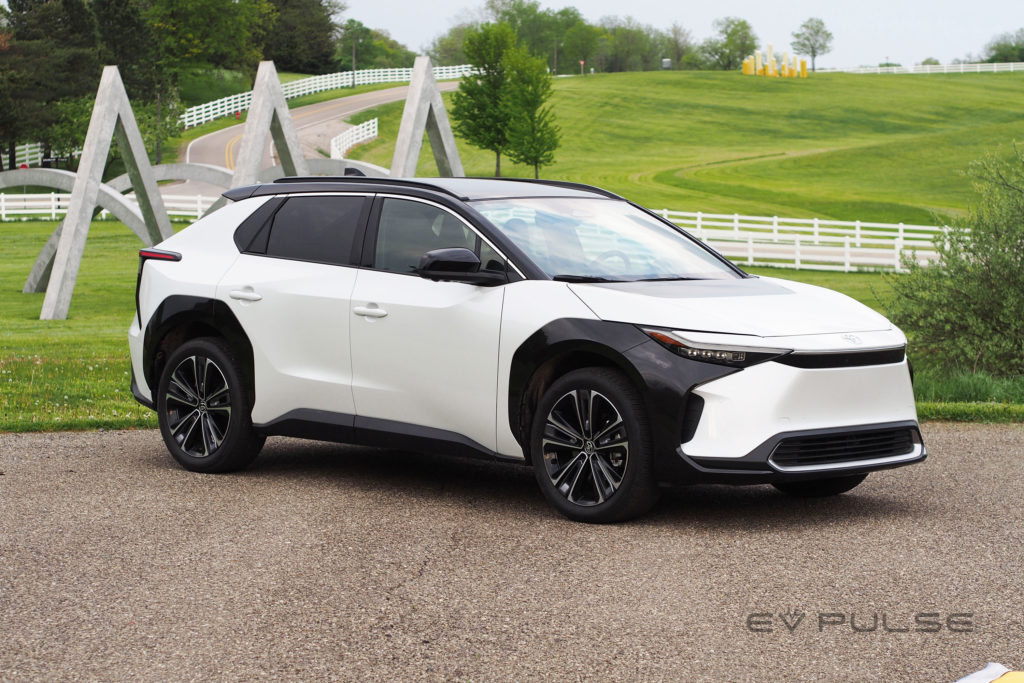
Unfortunately for Toyota, these figures do not compare favorably to major rivals. The Tesla Model Y, Ford Mustang Mach-E, Kia EV6 and Hyundai Ioniq 5 each cross the all-important 300-mile threshold in their longest-range configurations. The Volkswagen ID.4 misses that target, but still offers significantly more miles between charges (280) than even the longest-legged bZ4X.
Of course, an EV with modest range is still workable, but things get worse for Toyota when we look at DC fast charging times. All bZ4Xs come with a lithium-ion battery, though front- and all-wheel-drive models feature packs from separate suppliers, so the charging speeds are wildly different. Front-drivers can DC fast charge at up to 150 kilowatts, a competitive figure, but all-wheel-drive variants top out at just 100. In our testing, however, even that figure proved optimistic as the best we saw was 86 kW from a charger capable of delivering 350. Going from basically a 0% state of charge to 96% took about 3 hours and 15 minutes. We were aiming to hit 100% but gave up since the rate plummeted to around 3 kW and the charger estimated it would take another 90 minutes to fully juice the battery. Yeah, no thanks. We have a comprehensive video all about the bZ4X’s unusual charging curve and you do not want to miss it. Also, consider subscribing to the EV Pulse YouTube channel, so we can bring you more informative (and hopefully entertaining!) content like this.
In comparison, the Model Y’s charging rate tops out at a mighty 250 kW. The EV6 and Ioniq 5 twins are able to absorb energy at an impressive 235 kW, while the Mach-E maxes out at an adequate 150 kW. As for the ID.4, it’s rated at 135 kW.
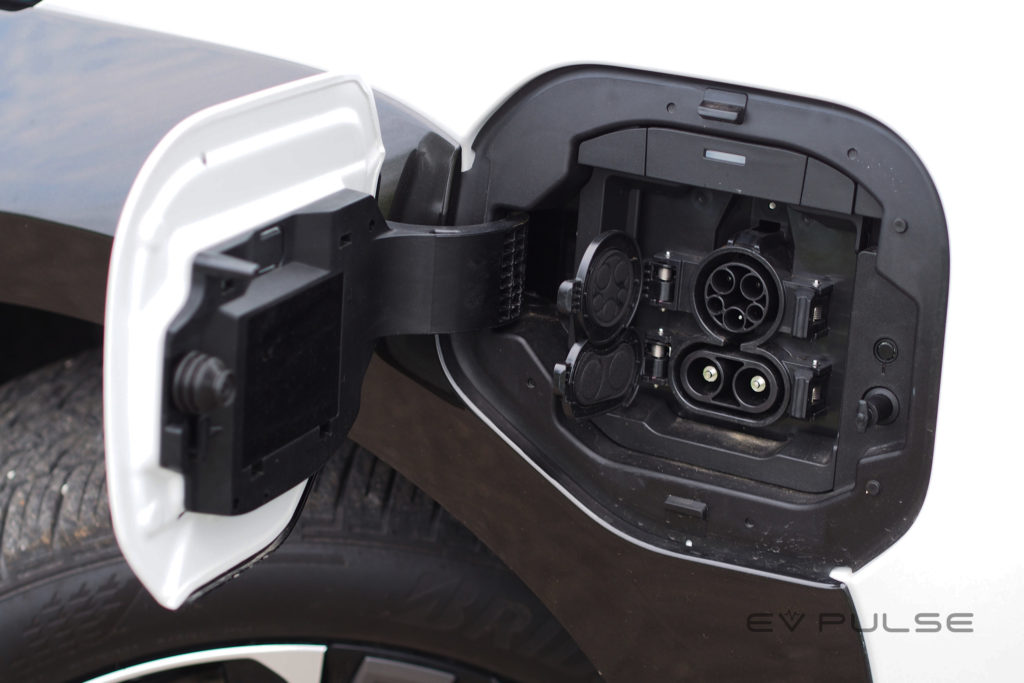
The all-wheel-drive bZ4X’s DC fast charging performance is not competitive, but on the plus side, this may never be an issue if you avoid long trips. The overwhelming majority of drivers are sure to juice up their bZ4X from a Level 2 charger in their garage or carport, which can take the battery from a low-energy state full in about 9 hours, which is all over the competition like a coat of paint. Use this Toyota primarily for day-to-day, around-town transportation and you’ll never have to think — or worry — about its DC not-so-fast charging capabilities.
Sprightly performance
Under the hood, this Toyota has no front trunk, just a mess of wires, hoses and boxes, though it still has plenty of cargo space, nearly 28 cubic feet behind the second-row seat and a lot more with the split backrest lowered (at the time of publishing, Toyota had not listed an official seats-down figure).
In the performance department, front-drive bZ4Xs are graced with 201 horsepower and 196 pound-feet of torque, perfectly adequate figures. In comparison, all-wheel-drive variants feature a pair of 107-horsepower electric motors, one at each axle. Combined, that dynamic duo provides 214 ponies and 248 pound-feet of twist, figures that sound pretty unremarkable, but in practice, this Toyota scoots. From a standstill, the bZ4X hits hard when you nail the accelerator, those 214 Clydesdales whisking this SUV up to speed without drama. No, it’s not the speediest EV ever built, but this Toyota is way more performant than you’d expect based on the numbers, and it even feels punchier than a 290-horsaepower, rear-drive Mustang Mach-E.
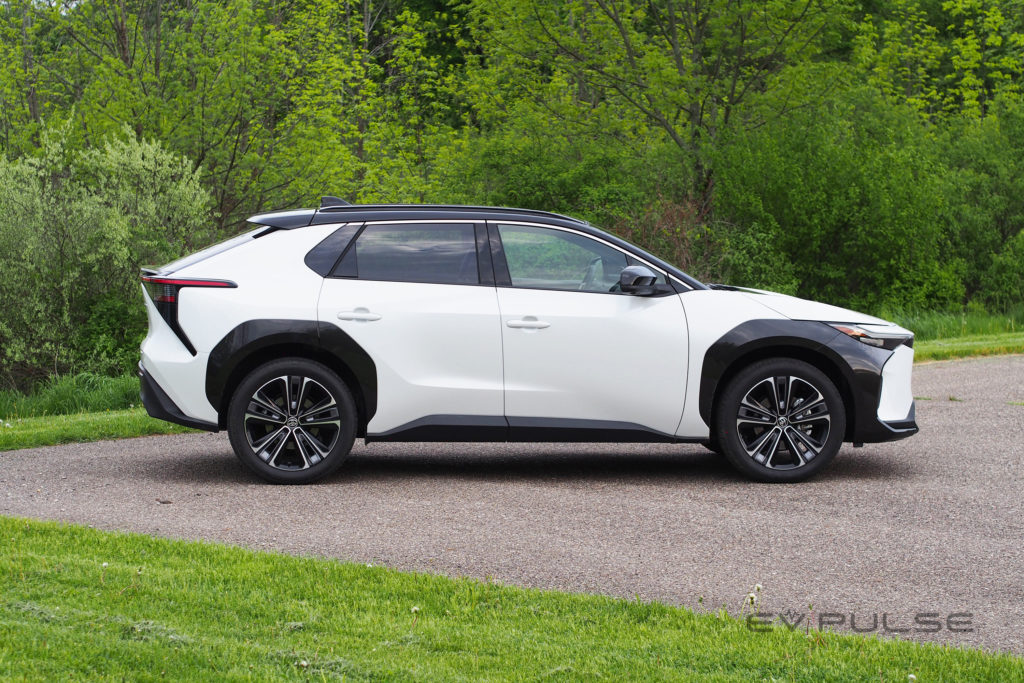
The bZ4X’s steering is light and precise enough, though you’ll never confuse it with a Porsche 911’s. Ride quality is one area where this Toyota has a significant advantage over the Mach-E. Whether you’re driving on bombed out back roads or a newly repaved section of interstate, the bZ4X is both smooth and well-controlled. Lower-end versions of that Ford, models without magnetic dampers, are surprisingly bouncy and unsettled, even on good pavement.
When it’s time to slow down, this Toyota’s brake pedal feels completely natural as it transitions from regenerative to friction braking. Unfortunately, a true one-pedal driving mode is not offered, though the bZ4X does provide a regenerative braking boost setting that does mostly the same thing. It’s not as aggressive as what you get in other EVs and the vehicle won’t roll to a stop, but the whole shebang works well. An automatic brake-hold feature is also included, so if that’s activated you don’t need to keep your foot on the pedal while stopped.
Improving safety and reducing fatigue, a wide range of driver aids is standard in this all-electric SUV. Lane-keeping assist, automatic high beams, front and rear parking sensors, pedestrian detection, blind-spot monitoring and rear cross-traffic alert are all included. Adaptive cruise control is bundled, too, and even though this system is not a hands-free solution like Ford’s BlueCruise or GM Super Cruise, it still works very well, doing an admirable job keeping the bZ4X in the center of its lane and smoothly adjusting speed based on traffic conditions.
A well-made and spacious interior
This SUV’s cabin design is expressive and functional. Toyota provided us with a prototype model for evaluation, but everything is super sturdy and assembled with exacting care. Aside from the build quality, I particularly love the fabric running across the dashboard. It looks great and feels premium, unlike the interior’s piano black trim. This stuff is the compulsive hoarder of the materials world because it never stops collecting dirt, fingerprints and scratches. If you’re OCD, keep a Swiffer duster in the glovebox.
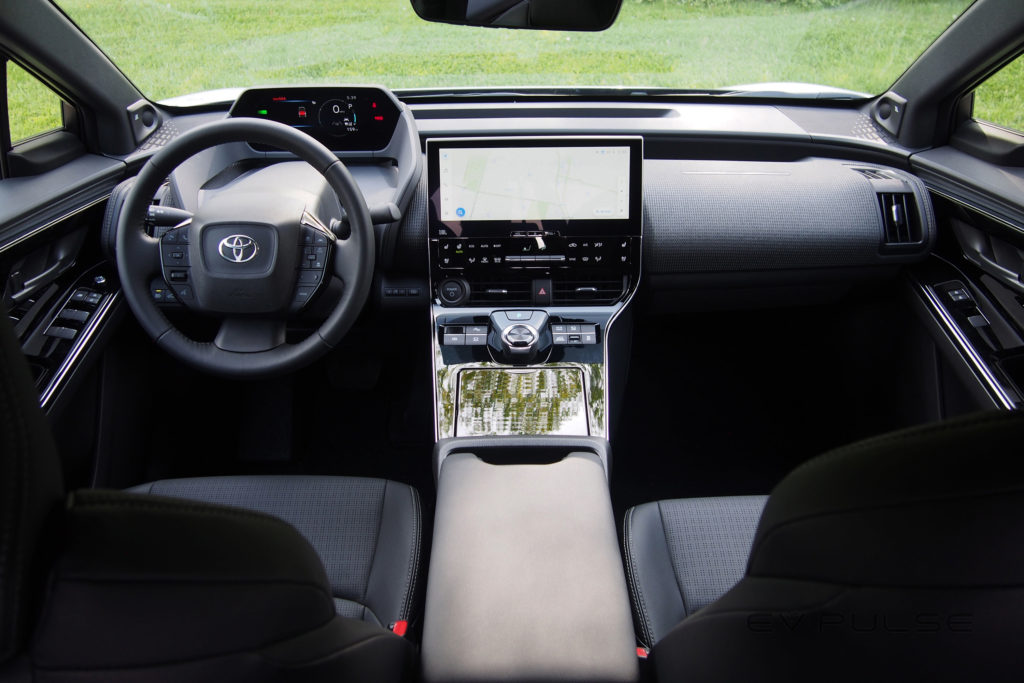
The bZ4X’s front buckets are perfectly pleasant, comfortable and supportive. The driver’s seat power adjusts in eight directions, though the front passenger’s chair is manual, moving in just six ways. Both seats are wrapped in rich-feeling simulated leather, plus they’re heated and ventilated, so based on the weather, you can roast your giblets or ward off swamp crotch (yep, that’s a technical term).
Passengers relegated to the back have little to complain about, as there’s plenty of legroom and enough noggin space for taller folks. The bottom cushion is a skosh too low for optimal comfort, though our tester also has rear air vents, heated outboard seats and a pair of USB type-C ports, welcome features in any vehicle.
There’s plenty to love about this Toyota’s interior, but there are a few head-scratching oddities, too. One issue is the digital instrument cluster, which is mounted high and far forward on the dashboard. Like a poor man’s head-up display, this is great for visibility as your eyes don’t have to move too far from the road to see how fast you’re going, but the problem is, when I adjust the tilt-and-telescoping column to my preferred position, the steering wheel rim blocks the bottom half of the instrument cluster. To see the entire display, I have to lower the wheel significantly.
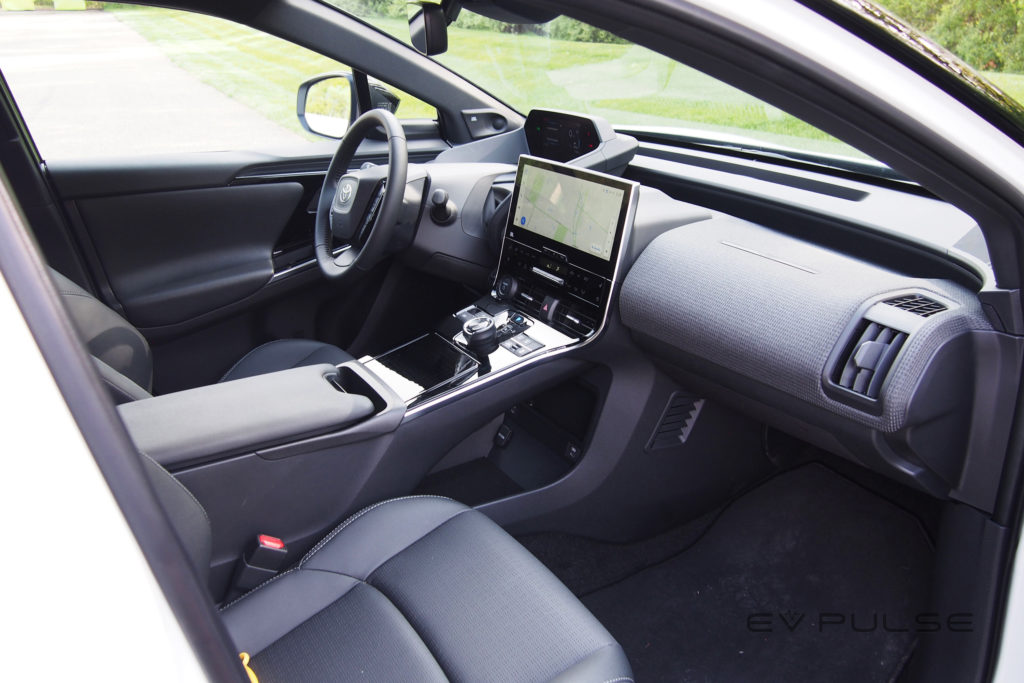
Next, the bZ4X copied Aston Martin, but not in a good way. It looks like there’s plenty of room for a glovebox, but there’s no storage space ahead of the front passenger’s knees. The available (and super clever!) radiant heating panel that warms your feet and legs is mounted where the door would normally be, but there’s no cubby behind it.
Lastly, the bZ4X has no volume or tuning knobs for the audio system. Of course, there are buttons on the center stack and satellite controls on the steering wheel spokes, but can we just have dials, please? Honda learned this lesson the hard way and I’m surprised Toyota didn’t take note. There’s no need to reinvent the wheel when it comes to radio controls.
Final thoughts: 2023 Toyota bZ4X
Toyota’s latest and OK-est EV is available right now and starts at about $43,215 including $1,215 in destination fees. This top-shelf Limited all-wheel-drive variant checks out for a lot more, though it’s still entirely reasonable at an estimated $52,050, a figure padded by a few modestly priced options.
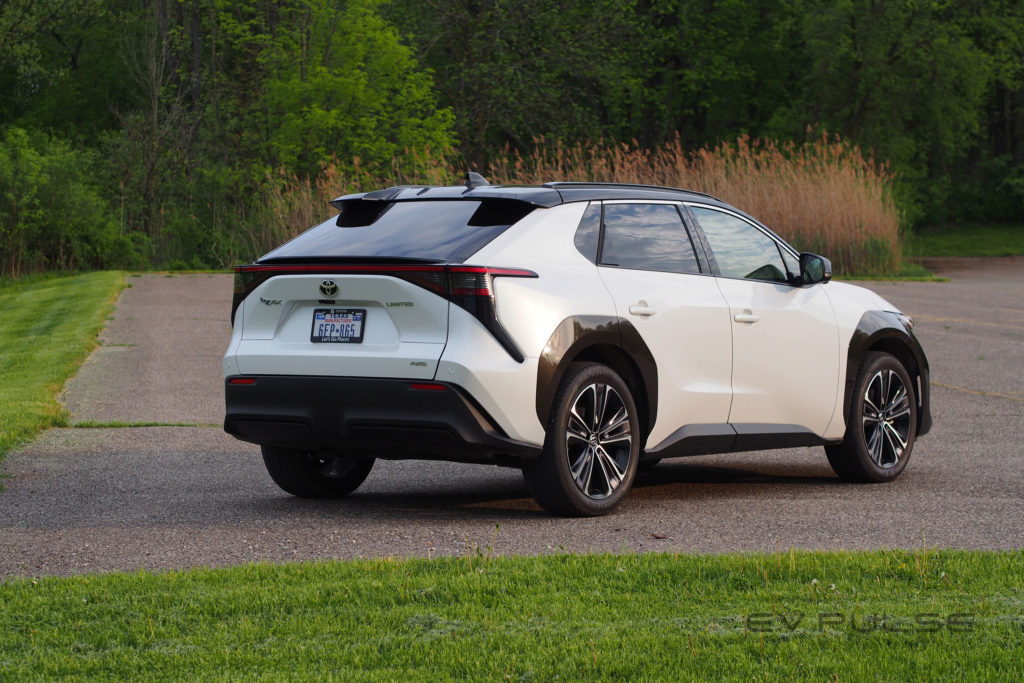
Even though it’s a good value and a nice runabout, this all-electric SUV is not one of my favorites. The bZ4X is comfortable and spunky, but it also feels like Toyota rushed this vehicle to market before it was fully developed. I’d take this family hauler over the tragic Mazda MX-30 100% of the time, and I’d consider it instead of the Volkswagen ID.4, but for not-significant reasons, the Ford Mustang Mach-E, Kia EV6 and Hyundai Ioniq 5 are all more appealing options.
At a glance
- Year: 2023
- Make: Toyota
- Model: bZ4X
- Trim: Limited all-wheel drive
- Type: 4-door crossover SUV
- Horsepower: 214
- Estimated MPG ratings (city/highway/combined): 112/92/102
- EV range: 222 miles
- Pros: Unexpectedly strong performance, settled ride, spacious interior, quality trimmings
- Cons: Obscured instrument cluster, languorous DC fast charging, lack of volume and tuning knobs, unimpressive range, weird name
- Base price: $43,215
- Price as tested: $52,050
